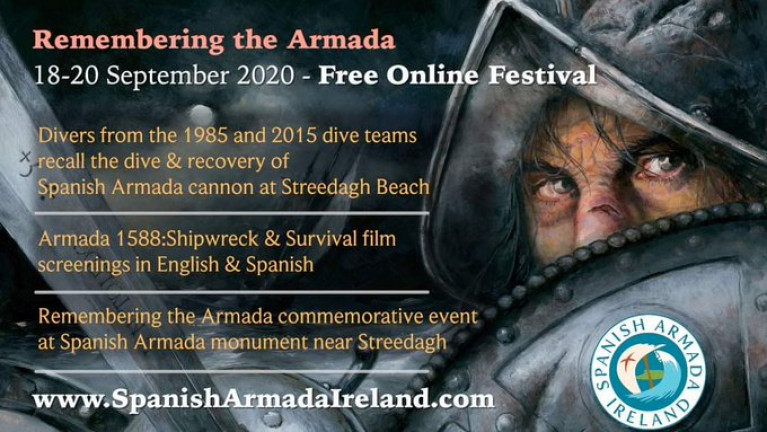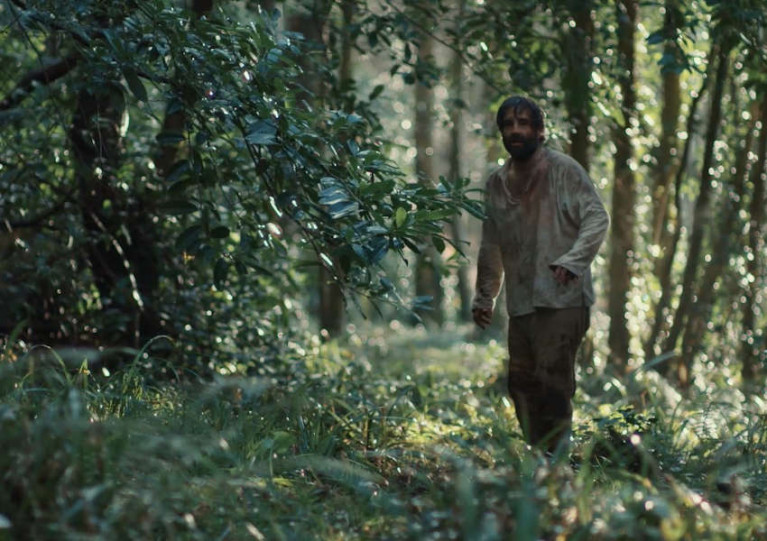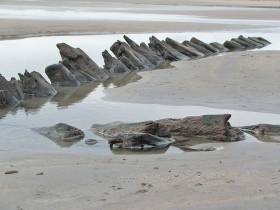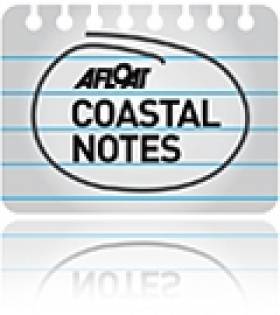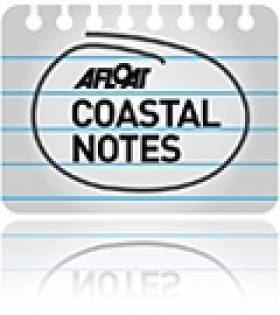Displaying items by tag: Spanish Armada
A film about the adventures of a Spanish Armada survivor of the shipwrecks off the Sligo coast in 1588 is to be screened in Madrid, Spain, next week as part of Semana de Irlanda or Irish week.
As The Sligo Champion reports, the film entitled Armada 1588: Shipwreck & Survival, recounts the fortunes of Captain Francisco de Cuéllar, who was one of a small number to make it ashore at Sligo's Streedagh beach.
Three ships in the Armada fleet, La Lavia, Santa María de Visón and La Juliana, are known to have foundered off Streedagh on September 21st 1588, claiming approximately 1,100 lives, including soldiers and sailors.
De Cuéllar wrote a detailed account of the shipwrecks, and of the following seven months he spent on the run,
“From being hurled by the waves up onto the beach, until he escaped to the relative safety provided by some local Gaelic chieftains, de Cuéllar was in constant danger during the months he spent in Ireland,” Eddie O’Gorman, president of Spanish Armada Ireland, a voluntary group that produced the film, told the newspaper.
The film is being screened in two large venues in Madrid on March 12th, and both are already sold out.
Both Eddie and producer Mícheál Ó’Domhnaill co-wrote the script with film director Al Butler of Media Coop in Dublin.
The film was financed by the Department of Rural and Community Development under Town and Village Renewal funding, and supported by Sligo County Council.
Read The Sligo Champion here
Spanish Armada Festival: Sligo Commemorates Streedagh Shipwrecks
The annual Spanish Armada festival returns this September for the 14th consecutive year and will occur in Grange, Streedagh, Cliffoney and Sligo Town. With lots of events taking place covering arts, history, culture, music and the spoken word, Remembering the Armada is a great weekend event for all to enjoy this 14th-17th September 2023.
Three Spanish Armada ships sank at Streedagh beach in September 1588, and over the past fourteen years, locals in Grange have welcomed Spanish visitors from far and wide to Sligo for the annual Armada commemoration.
 (Above and below) Sligo's annual Spanish Armada festival returns on September 14th with some dramatic reconstruction and commemoration
(Above and below) Sligo's annual Spanish Armada festival returns on September 14th with some dramatic reconstruction and commemoration

This year's event will run over four days from Thursday, Sept 14 – Sunday, Sept 17th. Day one will feature a bus tour to Killybegs Harbour to commemorate the 1588 Armada and will include a reception attended by officers and ratings from the visiting Oceanic Patrol Vessel Centinela.
The main event is the Remembrance Parade on Saturday, where people are invited to walk a trail from to pay tribute to those lost in the tragedy. Over 1,100 men lost their lives at Streedagh during the shipwrecks, one of the greatest maritime tragedies to have taken place on the Irish coast.
 (Above and below) The Spanish Armada remembrance parade and wreath laying ceremony
(Above and below) The Spanish Armada remembrance parade and wreath laying ceremony

Over the course of the weekend, numerous activities will take place both day and night. The Opening Concert will feature the renowned De Cuéllar Quartet, a musical ensemble that will play the music of the wonderful De Cuéllar Suite composed by Michael Rooney and accompanied by spoken word performances. For those who like to get out and about, there will be a Sligo City historical tour, and we'll also bring you along sections of the De Cuéllar Trail. Budding artists are invited to two special art events, ‘Armadascapes’ and ‘Hold The Line’ at Streedagh. The ever-popular Céilí and Armada Clubs will have you dancing late into the night.
 The Spanish Armada Festival 8k Fun Run/Walk
The Spanish Armada Festival 8k Fun Run/Walk
 The Spanish Armada Festival Heritage Tour
The Spanish Armada Festival Heritage Tour
In addition, there will be exhibitions at the Visitor Centre in Grange as well as re-enactments at various locations. On Sunday, the 8k Fun Run/Walk will help you shake off the cobwebs, and there will be a beach clean and a series of Climate lectures to finish off the event.
Event and ticket details here
This year's Spanish Armada Festival returns next monthand will be the 14th consecutive year that the annual event has taken place in Co. Sligo.
The event runs from Thursday 14th to Saturday 17th September and this will involve four locations: Grange, Streedagh, Cliffoney and in Sligo town.
Plenty of events are lined up reports the Sligo Champion over the course of the four-day festival covering arts, history, culture, music and the spoken word.
What is at the focus of the festival is of the three Spanish Armada ships that sank at Streedagh beach during storms on 21st September, 1588.
The armada wrecks, Afloat highlights comprise of the La Lavia, Santa María de Visón and La Juliana which got caught up in The Great Gale. This once in a generation storm resulted in the deaths of approximately 1,100 Spanish lives, including sailors and soldiers who perished at Streedagh.
Since the festival was established in 2009, the locals of Grange have welcomed Spanish visitors from far and wide to Sligo for the annual commemoration.
On the opening day of this year's festival there will feature a bus tour to Killybegs Harbour in neighbouring Co. Donegal. The tour to the harbour is to include a Spanish Navy ocean patrol vessel the Centinela (P-72) which is to make a special visit as part of the festival.This is where a reception to mark the Armada is to be attended by officers and ratings of the Centinela.
The Serviola-class patrol vessel, Afloat notes was built in 1990 by the Spanish shipbuilding group, Navantia which is part of Team Resolute, a UK consortium including Harland & Wolff, that is to assemble in building a trio of Fleet Replenishment Support Ships for the UK Ministry of Defence.
As for the festival's main event, this will be the Remembrance Parade which will be held on Saturday, the final day of events.
The public are invited to walk a trail from Streedagh to the Armada Monument so as to pay tribute to those lost in the tragedy, one of the greatest maritime tragedies to have taken place on the Irish coast.
More here from the regional newspaper.
Spanish Armada Wrecks at Streedagh Beach to Feature in International TIDE Conference in Sligo
Armada experts from across Europe will converge on Sligo on May 24-25th next for the Spanish Armada TIDE International Conference. The conference, titled Turning the Tide - revealing the past through new eyes, will feature speakers from Spain, Ireland, the UK, France and Portugal who will deliver insights on a range of topics from Armada history to other maritime links between Spain and Ireland.
Three Armada ships sank at Streedagh Beach in Sligo in 1588. The wrecks were first discovered in 1985, and a supervising member of the dive team, Dr. Colin Martin, will provide one of the key conference talks. Fionnbarr Moore, who led the Underwater Archaeology Unit when the wrecks were rediscovered in 2015, will also speak.
Three Armada ships sank at Streedagh Beach in Sligo in 1588
As new material is published and discussed, the conference will also hear of the fate of Armada prisoners, 3,000 of whom were captured, as well as documentation which provides new insights on the Armada story, along with other interesting topics like how the Armada soldiers and sailors faced enormous challenges to stay alive even after the conflict with England had ended.
In addition, broader themes will include a study of the pirate queen Grace O'Malley (Granuaile), who lived at the time of the Armada, as well as a focus on the aftermath of the Flight of the Earls, with a particular focus on the O'Donnell clan, whose path to Spain and Portugal resulted in their establishing military connections in both countries that last to the present day. And we'll hear of centuries of naval expeditions between Spain and Ireland, and the possible DNA links between the countries.
And the conference will provide insights into the modern museum experience and how we expect to engage with our history into the future. This will include a lecture on virtual and augmented reality, and a new Spanish Armada diorama of the Streedagh wreck site will also be unveiled.
Tickets for the Armada Lecture Series, and for a production of Cannon in Sea, a musical interpretation of the Armada, are now available on Eventbrite or at www.spanisharmadaireland.com.
The organisers say the lectures, which will take place at the Glasshouse Hotel in Sligo on May 24th and 25th next, have limited capacity. "We urge Armada enthusiasts and those with a broad interest in our shared history with Spain, to book tickets as we expect to be at capacity for all lectures", they add. Tickets are FREE and limited to two tickets per booking.
Programme to Remember the Spanish Armada Is 'Online' this Weekend
Remembering the Armada commemoration of the Spanish Armada at Streedagh Beach will take place but online only this month due to the Covid-19 pandemic.
Now in its 10th year, this year's Remembering the Armada programme will take place between 18th-20th September and is available completely free of charge to the public on SpanishArmadaIreland.com
"We have a wonderful series of online events this year," says Eddie O'Gorman, Chair of Spanish Armada Ireland. "Despite the challenges involved in running an online-only festival, this has enabled our committee to think outside the box in terms of what we can offer viewers in Spain and Ireland, people who normally would like to be here in person."
The main innovations in this year's festival is a series of three online lectures which will give a fascinating insight into the Armada's local history in Sligo.
Further details The Sligo Champion reports of the online event featuring divers in 2015 at the wrecks off Streedagh.
A new docudrama telling the story of a Spanish Armada captain shipwrecked in Sligo launches tonight (Friday 22 May) as a digital download.
Armada 1588: Shipwreck & Survival follows the tale of Captain Francisco de Cuéllar, who washed ashore on Streedagh Beach near Grange on 21 September 1588.
Based on a true life account, the 27-minute film describes how three Armada ships were wrecked at Streedagh, with the loss of more than 1,000 Spanish lives.
De Cuéllar was one of the few Spanish soldiers to escape death, and as the producers describe, “his flight to freedom includes capture and escape, ruin and salvation, told in the words of someone who had to reach the very limits of human endurance to survive”.
Directed by Al Butler and written by Butler with Micheál Ó Domhnaill, the film was produced for Spanish Armada Ireland by Dublin-based company Mediacoop. It features Spanish actor Fernando Corral as Francisco de Cuéllar, and also includes many local actors, production and technical staff.
The film was funded by the Department of Rural & Community Development, Sligo County Council and Spanish Armada Ireland under the Town & Village Renewal Scheme.
Additional production services were provided by Sligo-based production company Omedia. It was filmed in February 2020 in locations across Sligo and Leitrim and is the first docudrama produced exclusively on the life of De Cuéllar.
Presented in both English and Spanish, the film will be available as a digital download at SpanishArmadaIreland.com from 9pm this evening, following a special online screening for funding partners.
The cost to download the film is €4.99 with proceeds going towards the development of the Spanish Armada Visitor Centre in Grange.
Following its launch this evening, Armada 1588: Shipwreck & Survival will be entered in film festivals in Ireland and Spain, and its is hoped to also secure broadcast deals in both countries.
Sligo Group Promoting Armada Links Honoured By Spanish King
#SpanishArmada - A Sligo-based group dedicated to promoting the northwest coastal area’s links with the historic Spanish Armada has been honoured by the King of Spain in a special ceremony this week, as RTÉ News reports.
The Plate of the Order of Isabel La Católica, the highest civil order granted by King Felipe VI, was presented by Spanish Ambassador to Ireland José María Rodríguez-Coso to the members of the Grange and Armada Development Association (GADA) at Sligo Town Hall.
The first Irish recipients of the honour, recognising groups and individuals who foster relationships between Spain and the international community, have worked hard to promote and preserve the history of the three Spanish Armada ships that were wrecked at Streedagh in 1588.
Three years ago, an almost completely intact rudder from one of the armada ships was discovered on the beach at Streedagh. Following that a number of cannons and other ship artefacts were recovered on dives to the wreck sites.
And the search for more items from the shipwrecks is ongoing, with marine archaeologists’ latest survey of the area taking place over the summer, according to TheJournal.ie.
The event comes almost a year after the Spanish Navy sailed into Sligo town for the first time since the armada in 1588 for a ceremony in memory of that historic fleet, as previously reported on Afloat.ie.
Armada Wreckage Washed Onto Sligo Shore
#SpanishArmada - More wreckage from Spanish galleons shipwrecked off the northwest coast more than 400 years ago has been washed up on a Sligo beach.
And according to The Irish Times, it's possible that this weekend's low tides could expose even more remnants from the three vessels - sparking concerns for the integrity of the wreck sites, which lie in 15 metres of water some 60 metres from the low tide mark.
Donal Gilroy from the Grange and Armada Development Association (GADA) said the wooden objects found on the beach this week had "been buried off Streedagh for nearly 430 years. It is lucky they were not carried out by the tide.”
The find comes just months after a near fully intact rudder, believed to be from one of the 1588 fleet, was discovered at Streedagh beach by a local farmer.
“This is a protected site but we worry that these boats are being moved by storms," added Gilroy. "They have thrown up more in the last two years than in the previous 40."
The Irish Times has more on the story HERE.
Farmer Finds 'Important Piece Of History' At Spanish Armada Wreck Beach
#SpanishArmada - A rudder from a ship that formed part of the Spanish Armada discovered at a beach in Co Sligo recently has been transferred to the care of the National Museum for preservation and study.
As Sligo Today reports, the 20-foot rudder was found on the beach at Streedagh – renowned for hosting the wrecks of three ships from the 1588 galleon fleet – by a local farmer, who contacted the Department of Heritage's Underwater Archaeology Unit.
Dr Nessa O'Connor of the National Museum, who was engaged to dive at the Streedagh site with Dr Douglas McElvogue of the Mary Rose Trust, was said to be so impressed with the discovery that she arranged for it to be immediately removed for preservation.
The rudder is almost completely intact, with a piece missing which the archaeologists believe may have been picked up at random by a passer by believing it to be driftwood.
It's hoped that this part can be recovered to put together "an important piece of history". Sligo Today has more on the story HERE.
#SYMPOSIUM: SPANISH ARMADA - As part of the four-day long Celtic Fringe Festival, there will be an International Symposium on The Spanish Armada Wrecks in Ireland held on the weekend of 23 and 24th June. The symposium is to be held in Grange, Co. Sligo.
The maritime event will be visited by expert underwater archaeologists, surveyors, historians, authors, training officers and divers from Ireland and England.
They will piece together the fascinating story of 1588 through to the present day, detailing their own experiences and participation with underwater archaeological surveys, explorations, excavations, research, conservation and exhibition of artefacts retrieved from the Spanish Armada shipwrecks.
Particular focus will be given to the discovery & underwater archaeology of the three Spanish Armada galleons wrecked on Streedagh Strand, Co. Sligo; 'La Lavia', 'La Juliana' and 'Santa Maria de la Vision'.
A special symposium package costing €35 covers admission to the weekend held symposium. Also included is a buffet lunch on the Saturday. In the evening a Galician/Irish music session & seafood reception will be held. The symposium concludes on the Sunday at 1:30pm.
For further information including tickets, times and venue plus the list of guest speakers visit click HERE
As for the other events during the four-days of the Celtic Fringe Festival (20th - 24th June) there will be a programme of international musicians and dancers, drama, walks, tours, street entertainment, strawboys, food stalls and more. To view festival programme and ticket information visit www.celticfringefest.com


























